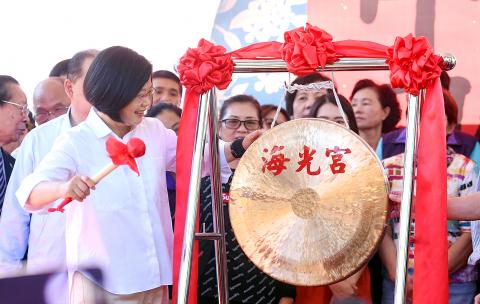President Tsai Ing-wen (蔡英文) yesterday rebuffed criticism over the potential loss of diplomatic ally the Solomon Islands.
“The situation with the Solomon Islands has not been decided,” she told reporters during visits to a temple and church in the Taipei area, who asked about reports that the Solomon Islands might switch diplomatic ties to Beijing.
Asked about comments by Kaohsiung Mayor Han Kuo-yu (韓國瑜), the Chinese Nationalist Party’s (KMT) presidential candidate, that the nation is “losing face and losing the battle” on international relations, Tsai said that foreign affairs are not about saving face, but “are full of tough challenges at the highest level.”

Photo: Liu Hsin-de, Taipei Times
Four things are important, she said.
“First, we need experienced people with an international perspective to take on these tasks,” she said.
The Republic of China needs to make more friends who share the same universal values and when the nation encounters problems, those friends should speak up for Taiwan and defend those shared values, she said.
“Second, we have the responsibility to uphold regional peace and stability,” Tsai said. “Third: For countries in need, especially our diplomatic allies, we must assist their people, helping their economic and industrial development.”
“Fourth, Taiwanese companies need the business opportunities in global markets,” she said.
“These four points have guided the government for the past few years and we are striving to keep them. By doing so, we can receive more support on the international stage and make more friends,” she said. “This is what Taiwanese expect in foreign affairs.”
Asked about Hon Hai Precision Industry Co founder Terry Gou (郭台銘) quitting the KMT, Tsai, who is seeking re-election, said: “No matter what, I will go all-out for the election campaign... We are confident about the overall situation in the run-up to the election.”
After a cultural event at the Haiguang Temple (海光宮) in Shilin District (士林), Tsai visited the Tamsui (淡水) Presbyterian Church in New Taipei City.
Tsai told church members that all Taiwanese hope that the president would defend Taiwan’s sovereignty, democracy and freedom.
“Freedom of religion and culture are the most cherished parts of Taiwan’s cultural heritage,” she said. “As president, I have the responsibility to preserve them.”

Alain Robert, known as the "French Spider-Man," praised Alex Honnold as exceptionally well-prepared after the US climber completed a free solo ascent of Taipei 101 yesterday. Robert said Honnold's ascent of the 508m-tall skyscraper in just more than one-and-a-half hours without using safety ropes or equipment was a remarkable achievement. "This is my life," he said in an interview conducted in French, adding that he liked the feeling of being "on the edge of danger." The 63-year-old Frenchman climbed Taipei 101 using ropes in December 2004, taking about four hours to reach the top. On a one-to-10 scale of difficulty, Robert said Taipei 101

Nipah virus infection is to be officially listed as a category 5 notifiable infectious disease in Taiwan in March, while clinical treatment guidelines are being formulated, the Centers for Disease Control (CDC) said yesterday. With Nipah infections being reported in other countries and considering its relatively high fatality rate, the centers on Jan. 16 announced that it would be listed as a notifiable infectious disease to bolster the nation’s systematic early warning system and increase public awareness, the CDC said. Bangladesh reported four fatal cases last year in separate districts, with three linked to raw date palm sap consumption, CDC Epidemic Intelligence

Two Taiwanese prosecutors were questioned by Chinese security personnel at their hotel during a trip to China’s Henan Province this month, the Mainland Affairs Council (MAC) said yesterday. The officers had personal information on the prosecutors, including “when they were assigned to their posts, their work locations and job titles,” MAC Deputy Minister and spokesman Liang Wen-chieh (梁文傑) said. On top of asking about their agencies and positions, the officers also questioned the prosecutors about the Cross-Strait Joint Crime-Fighting and Judicial Mutual Assistance Agreement, a pact that serves as the framework for Taiwan-China cooperation on combating crime and providing judicial assistance, Liang

US climber Alex Honnold left Taiwan this morning a day after completing a free-solo ascent of Taipei 101, a feat that drew cheers from onlookers and gained widespread international attention. Honnold yesterday scaled the 101-story skyscraper without a rope or safety harness. The climb — the highest urban free-solo ascent ever attempted — took just more than 90 minutes and was streamed live on Netflix. It was covered by major international news outlets including CNN, the New York Times, the Guardian and the Wall Street Journal. As Honnold prepared to leave Taiwan today, he attracted a crowd when he and his wife, Sanni,